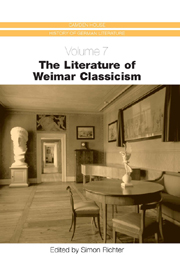Book contents
- Frontmatter
- Contents
- List of Illustrations
- Preface and Acknowledgments
- Conventions, Editions, and Abbreviations
- Introduction
- What is Classicism?
- Antiquity and Weimar Classicism
- The Correspondents' Noncorrespondence: Goethe, Schiller and the Briefwechsel
- Johann Gottfried Herder: The Weimar Classic Back of the (City)Church
- Drama and Theatrical Practice in Weimar Classicism
- German Classical Poetry
- The Novel in Weimar Classicism: Symbolic Form and Symbolic Pregnance
- German Women Writers and Classicism
- Weimar Classicism as Visual Culture
- The Irrelevance of Aesthetics and the De-Theorizing of the Self in “Classical” Weimar
- Goethe's “Classical” Science
- The Political Context of Weimar Classicism
- Bibliography
- Notes on the Contributors
- Index
Antiquity and Weimar Classicism
Published online by Cambridge University Press: 05 February 2013
- Frontmatter
- Contents
- List of Illustrations
- Preface and Acknowledgments
- Conventions, Editions, and Abbreviations
- Introduction
- What is Classicism?
- Antiquity and Weimar Classicism
- The Correspondents' Noncorrespondence: Goethe, Schiller and the Briefwechsel
- Johann Gottfried Herder: The Weimar Classic Back of the (City)Church
- Drama and Theatrical Practice in Weimar Classicism
- German Classical Poetry
- The Novel in Weimar Classicism: Symbolic Form and Symbolic Pregnance
- German Women Writers and Classicism
- Weimar Classicism as Visual Culture
- The Irrelevance of Aesthetics and the De-Theorizing of the Self in “Classical” Weimar
- Goethe's “Classical” Science
- The Political Context of Weimar Classicism
- Bibliography
- Notes on the Contributors
- Index
Summary
Weimar Classicism can be said to begin in 1786 when Goethe places his Iphigenie on the rocky shores of Tauris, longing for home, “das Land der Griechen mit der Seele suchend” (HA 5:7; seeking the land of the Greeks with her soul). The search for Greece, for a distant poetic homeland where one could find the beauty, harmony, and fulfillment lacking in the modern world, captivated an entire generation. Not only Goethe and Schiller, but their contemporaries from Lessing, Klopstock (1724–1803), and Wieland to the younger Jena Romantics shared the search for Iphigenie's Greece. Although the term “Weimar Classicism” correctly reflects a debt to the styles and traditions of antiquity, neither Goethe nor Schiller, nor any of their contemporaries, considered themselves classical. The term itself is a relatively recent coinage, designed to replace the misleading “deutsche Klassik,” which was a product of nineteenth century nationalistic literary hagiography. Weimar classicism is also potentially misleading, for it suggests an exclusive or dominant form of classicism and sets a select group of authors — often only Goethe and Schiller — apart from their German and European contemporaries. In fact, the works of the Weimar writers represent only one current of Romantic Hellenism, one vision of classical revival among many. For writers at the close of the eighteenth century, “antiquity” did not signify a coherent historical or philosophical system; it was, rather, like Iphigenie's faraway home, an absent ideal that reflected the dreams and ambitions of artists and their frustrations with their own imperfect age.
- Type
- Chapter
- Information
- The Literature of Weimar Classicism , pp. 63 - 90Publisher: Boydell & BrewerPrint publication year: 2005

